
lower jaw-bone ornamented, buried, and a tomb-bonse
built oyer it. The bands and hair of kings’ officers
are preserved in a similar manner. The umbilical
cord of male children is buried inside the doorway,
and those of females outside, as was the custom also
at Zanzibar. We had not much sickness while at
Unyoro, but there were some cases of tertian fever and
dysentery. Amongst the inhabitants there were no
remarkable diseases; the only complaint of the men
was that their progeny did not always live; they
could not have the number of children they wanted—
a fact which can only be explained by the poverty of
their diet and the abuses of polygamy.
Our situation was little better than that of a
prisoner in a solitary cell. We certainly had our
“ morning post” after breakfast—-the king’s messenger
—but there was seldom any news, and the day hung
heavily. No one was allowed to visit us but these
postmen coming to ask how we had passed the
night. Natives from interesting countries all round
would visit the king, but we could not see them!
Dances and parties went on, and we could not attend
them. Rain was felt as a relief, as it employed one
in reading the gauge every morning. The insects at
night were interesting, particularly a species of glowworm
half an inch long, seen amongst the roots of the
grasses. If placed upon the hand or sleeve, it travelled
quickly, throwing out a constantly twinkling light
at shorter intervals than the firefly, which also was
numerous. We slept in separate huts. Mine was
occupied by my two servants, who, though only
screened from me, talked incessantly to themselves
or to me, and sometimes got up to eat in the middle
of the night. The head-servant was an intelligent
Seedee, named Uledi. On asking his opinion as to
copal, which is used as varnish, he said it was not the
production of an insect, although an insect is always
seen inside; but is a formation from the roots of
decayed trees, called % nango,” plentiful in Utumbee.
The march to the north from the capital of Unyoro
was effected, as before mentioned, by sending Bombay
and Mabruk in charge of some northern men, with a
letter to find out whether Petherick was upon the Nile
with boats for us. Kamarasi would not hear of our accompanying
them : besides which, he said that, when
we did leave, he meant to keep five men of each of the
three races we should pass through, as hostages, till he
heard of our safe arrival! After many days of suspense,
on the 1st of November, when working at some
lunars, a gun was fired in the direction of the king’s
house, then another was heard. In the distance a man,
it was reported, was seen with trousers on. It was
Bombay; and his dress was hailed by us as a substantial
proof that he had come in contact with
civilisation. For a moment there was a feeling of
disappointment, as if we had nothing further to do.
Our expedition seemed over, and we tried to scan or
predict the far-distant future. What would be our
next duty ? What our destiny ?
In gratitude to Kamarasi, we sent him everything
we could possibly give away, asking whether he had
any objections to our leaving. He replied that a
couple of our Zanzibar Seedees, with their guns, must
be left with him, as he required them to deceive his
enemies into believing that we were still his guests.
Many other excuses about the unsafe state of the road